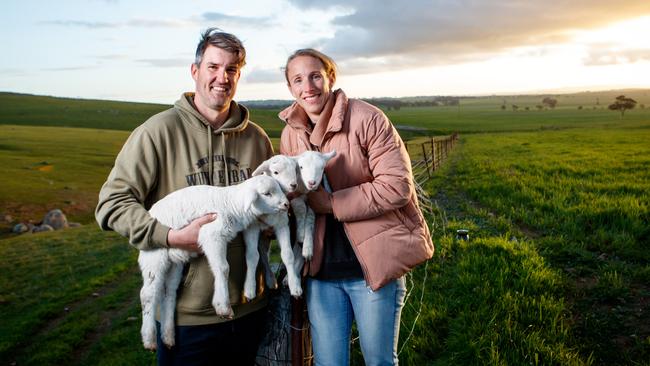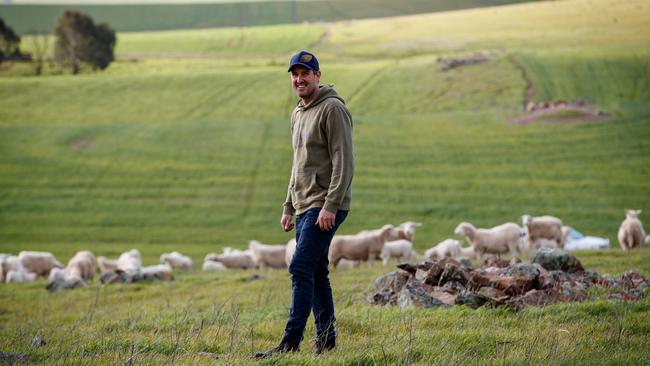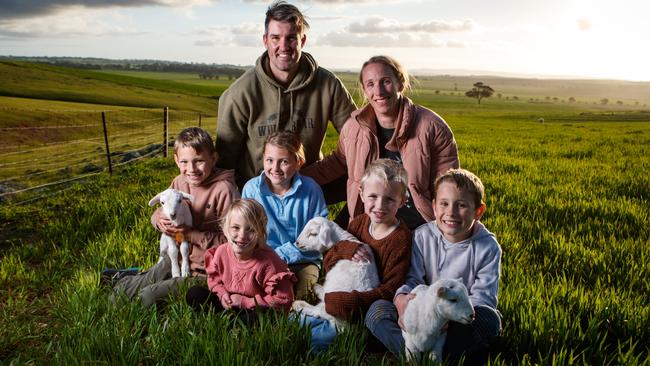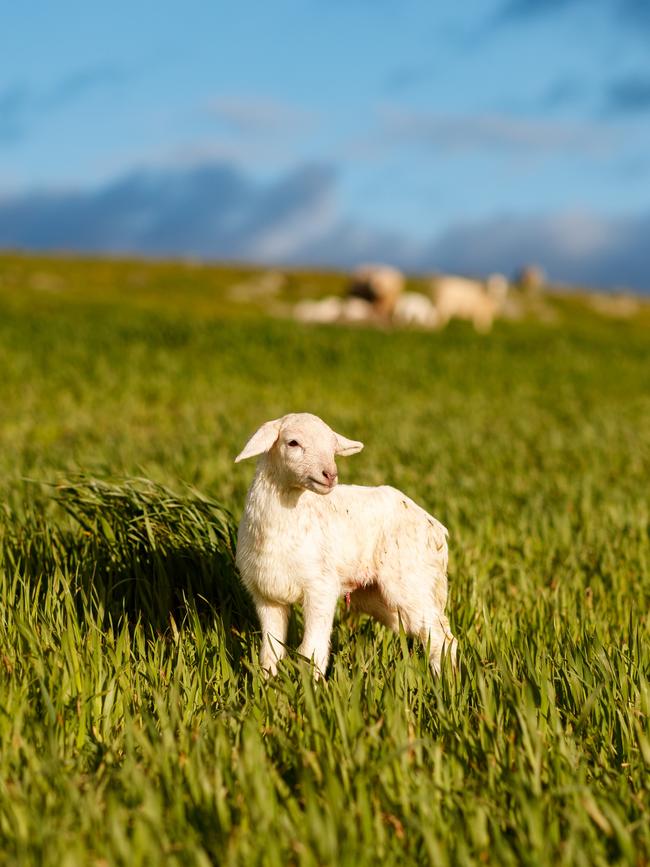Australian Whites: Wunderbar Lamb builds business with welfare and flavour focus
Now Ben and Kerry Heinrich have shifted to a shedding sheep breed, dubbed the “Wagyu of lamb”, their own-brand meat is top of the menu for conscientious consumers.

It was the end of a long, hot day of shearing in South Australia’s Clare Valley 20 years ago when Ben Heinrich’s father let slip a little fact about sheep that captured Ben’s imagination.
Though he was just a teenager then, the revelation put young Ben on a mission to completely transform his family’s lamb and wool operation, and eventually launch his own premium lamb brand.
“We used to shear in February … and being stuck in a hot shed for two weeks in the middle of summer was never something I looked forward to,” said Ben, 36, who grew up on his family’s 780ha property at Black Springs, helping his dad, Ken, and his late-grandfather, Jack, run Merinos for wool, produce prime lambs and grow grains.
“The Old Man said, ‘you know they make sheep that shed their wool’. And I was like, ‘What?’.”
Laughing at how excited he had been, Ben said Ken’s nugget of wisdom triggered big changes on the Heinrichs’ fifth-generation property, now run by Ben and his wife, Kerry, with support from Ken.
Ben returned to the family farm in 2003, and soon after started researching shedding sheep breeds.

With Ken’s OK, Ben and Kerry shifted out of Merinos, crossing Wiltshire Horns with their flock to phase out wool by 2013, then adding Australian Whites to the mix to produce lamb with excellent eating quality.
Launching their own brand, Wunderbar Lamb, in 2014, Ben and Kerry now produce premium free-range lamb to the highest animal-welfare standards.
They sell directly to chefs, butchers, independent supermarkets and locals in the Mid North and Adelaide regions of South Australia, with plans to expand their customer base in the future.
SHEDDING THE WOOL
The Heinrichs have always made animal welfare a top priority.
Mulesing was a hot topic back in 2003, when Ben first started researching shedding breeds.
“This is when PETA were banging the drum about the tailing and mulesing side of things,” Ben said.
He and Ken worked hard to meet the industry-wide goal to stop mulesing by 2010, which was later ditched by Australian Wool Innovation. Ben said at the time “wool was worth bugger all”, which meant return for their effort was minimal and shedding sheep seemed even more attractive.
Fourth-generation wool grower Ken was on board with the change.
“He could probably see the writing on the wall,” Ben said. “It was probably that (the choice) was sheep with no wool, or no sheep at all. He was happy enough to come along for the ride.”
While making the transition, Ben continued selling lamb through the markets, but was unimpressed by the prices they fetched – “you are getting penalised by them not looking like everything else,” he said.
After receiving great feedback about their lamb from chef friends, he decided to try selling directly to butchers.
“I knew if you just start something up, you have to have some way of getting your foot in the door,” Ben said. “With the full shedding sheep we had the opportunity to not tail them; we don’t have to mules them; we are not feedlotting.
“That worked into our hands.”
Focusing on their animal-welfare credentials, Ben and Kerry pursued accreditation, becoming the first lamb producers in Australia to be certified through Humane Choice.
“I think it is the way the world is heading,” Ben said.
Annual audits confirm their sheep are raised free range on pasture with low stocking densities, and not subjected to tail docking, mulesing or growth hormones.
“This is what we are about,” Ben said. “Ideally you’d want to be organic. But, we can’t be organic because cropping is still the major source of income of this place.”
BREED APART
Ben and Kerry initially built their shedding flock by mating their sheep with Wiltshire Horns, but quickly discovered one major problem.
“They were seasonal. They only lamb in August,” Ben said.
“I soon worked out if you are going to do this (own brand) thing you need all 52 weeks supplied. My initial lot lasted for a month or two then dried up, then when my next lot were ready, (customers) had moved on.”
In mid-2014, Ben and Kerry shifted to Australian Whites, which they said had opened up their breeding program.
“There’s all the talk of them being the Wagyu of lamb and their superior eating quality,” Ben said.
“We thought, well, if we are branding our lamb we might as well use the best.”
They now aim to run 1000 ewes and produce 1000 lambs a year, plus self-replacing ewe lambs, with three joinings every two years. The flock grazes pasture all year, running on grain stubble for a short time after summer harvest.
Ben said they turned off 10-15 lambs a week, but were working to increase that to 20.
Kerry, a trained agronomist, has turned her analytical skills to production management, using apps including AgriWebb and Lambing Planner to tailor mating, lambing and grazing schedules to ensure year-round supply.
“She is the driving force,” Ben said. “She was probably more of a farmer than me growing up.”
A busy woman, Kerry balances on-farm work with running her own clothing business and also raising their five young children, Emmison, 10, Archer, 9, Fred, 8, George, 6, and Macartney, 4.

Lambs are weaned at 12 weeks and processed at 45-48kg live weight, for a carcass weight of 23-24kg. Every Monday, Ben takes a batch of lambs to Menzel’s Meats abattoir at Kapunda, where they are processed then delivered to his network of butchers by Thursday.
“I’ve tried to keep it very simple and not get stuck into the trap of delivering myself or making home deliveries,” Ben said.
Relying on an established supply chain frees Ben up to put energy into what happens in the paddock.
“There is a lot more forward planning and thinking and strategy,” Ben said.
“Sometimes in spring things start growing like mushrooms, and have a bit too much fat on them, and you have to pull them out of the paddock and run them in the hills.”
The diligent management has been worth the effort.
“If you focus on supplying a good thing every week eventually word gets out. Lately my phone has been ringing with people who have heard about me and want to try some of our lamb,” Ben said.
“It does give you a bit of pride knowing that is your lamb in the window.”
CROPS IN THE MIX
With 193ha of wheat, 143ha of canola and 60ha of lupins planted this season, crops were the mainstay of the Heinrich operation, Ben said.
After two shocking seasons in 2018 and 2019, with rainfall below 300mm, they bounced back with 430mm last year, just shy of their supposed-average of 450mm.
“This year is looking pretty good … so far we have had 265mm,” Ben said.
Dry seasons have hit yields, but frost has been the major killer, slashing wheat tonnage in recent years.
“Especially last year when we thought we had recovered from a dry winter with a really good spring, but to be hit with one night of frost in late September,” he said.
Their hoped-for wheat yields of four to 4.5 tonnes per hectare dropped to 2.5 tonnes last year, with some cut for hay. Export hay has been the family’s best performing enterprise in dry years, averaging 3.5 to five tonnes, with solid prices.
The family sowed 383ha of pasture this year, but have left export hay out of the mix, due to doubts about returns.

“As I’m getting older, I seem to be getting more passionate about the sheep side of our operation as the reward for effort isn’t always there with cropping,” Ben said.
“And I find working with sheep that don’t need shearing or crutching a lot more enjoyable.”
He hopes this season will prove a winner for both crops and sheep.
“It is all a bit too good to be true. I don’t know what can happen to spoil it all,” he said.
“If the frost can stay away we might be looking at a very good year … it will be good to bounce back.”


